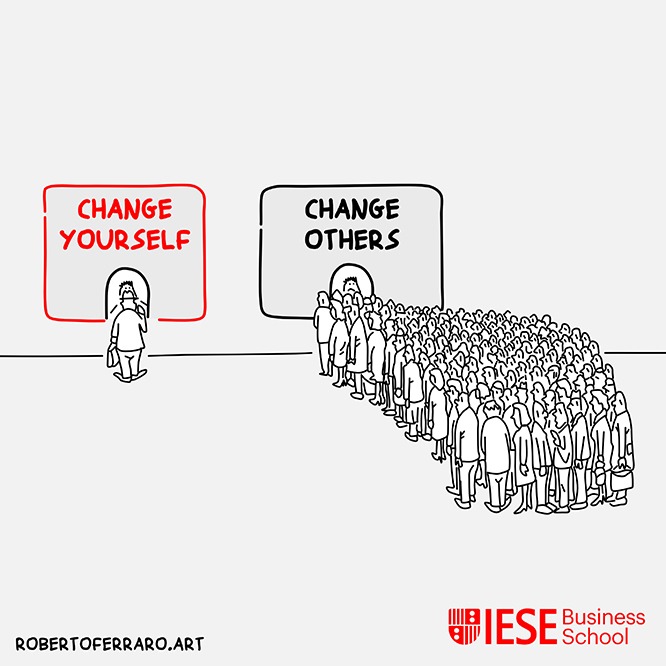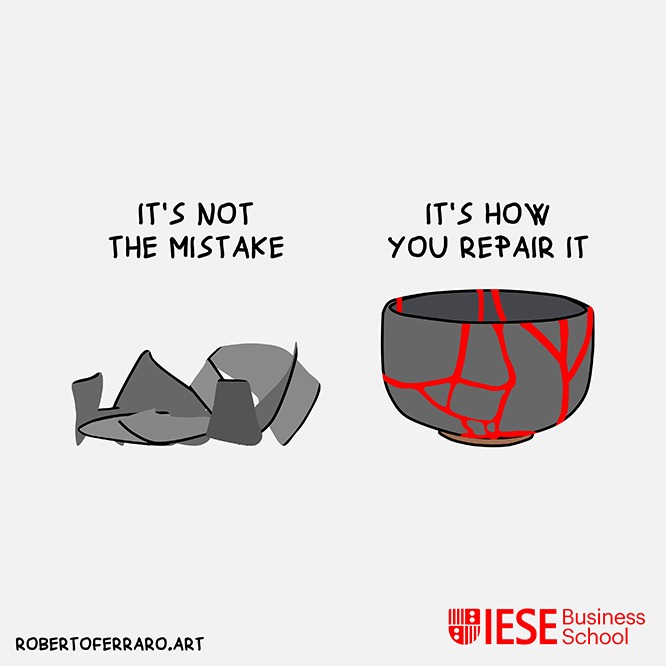Leading is much more than managing resources, making decisions, and designing strategies. And, of course, it is an art that goes well beyond imposing orders and instilling discipline.
Although today’s business environment — competitive, uncertain, and complex — often pushes us to focus solely on efficiency and short-term results, the major challenges faced by most organizations and society at large require a broader and deeper reflection on the impact and true potential of leadership.
Beyond the essential technical and management skills, true leaders who are respectful, critical thinkers, and ethically responsible are able to achieve more ambitious goals by fostering a collaborative environment based on shared values and pursuit of the common good.
Plus, they inspire their teams to work not just effectively, but with integrity and with the ambition to contribute to the development of society, spreading that spirit to the rest of the organization.

Ethics and leadership: Trust, responsibility, and setting an example
Based on a recent interview with IESE Professor Santiago Álvarez de Mon, this article lays out the key pieces of ethical leadership, a powerful driver of positive change in companies and society alike.
1. Power is not the same as authority
We often confuse leadership with the mere possession of power granted to us from holding a particular position. Having the official capacity to make decisions, give instructions, and have others obey as a result of our rank does not make us leaders. Instead, true leadership is rooted in autoritas, a term taken from Roman law which means moral authority.
This distinction is crucial for understanding that the essence of a true leader is based on their capacity to influence, inspire, and guide by example. In other words, it comes from their knowledge, their attitude, and how they take on the role. So, moral authority is built on the foundation of credibility, respect, and admiration — values that are indispensable for cultivating healthy, long-term relationships within any community.
2. Learning from mistakes and cultivating trust
Despite living in a constantly evolving context, leadership remains an inherently relational art. Thus, in addition to an attitude of integrity and respect, one of the factors that generates the most trust is a leader’s ability to recognize and learn from their mistakes.
According to Álvarez de Mon, “we have to rethink our relationship with mistakes. If you interpret a mistake as a failure, you’ll end up collectivizing it or looking for a scapegoat. On the other hand, if it’s just a different approach, that’s another story. The biggest creative and innovative minds, if they have won at anything, it’s at having made more mistakes. Now, they are quick to be wrong.”

3. Self-knowledge and vulnerability
Before you can lead others, it’s fundamental to learn how to lead yourself. This, according to the professor, is the natural challenge of all human beings: daring to be themselves and writing the book of their lives without anyone else writing it for them.
However, this journey toward authenticity and personal growth should not be confused with self-sufficiency. Leading other people means depending on them, and shedding light on that relationship and the vulnerability linked to leadership helps strengthen the relationships and the feeling of safety on a team. “No matter how good the orchestra conductor, a concert will never be wonderful if the musicians don’t want it; it cannot be imposed. If you depend on your team, what kind of relationship do you want to build with them?” Álvarez de Mon wonders.
4. Humility and intelligence in turbulent times
In such a complex world with such deep and fast-paced changes, the smartest option is to adopt a humble attitude in leadership. On one hand, this lets us take up a position of continuous learning and growth, as we are more aware of our limitations and talents, our behavior, and how our actions as leaders affect others.
On the other hand, humility also helps us more quickly adapt to the constant challenges of an ever-changing environment, as we will be more open to listening to the team’s ideas and perspectives, fostering a climate of innovation and continuous improvement. “It’s not military command; it’s a relationship governed by trust, respect, credibility, and energy,” the professor says.
5. Fair and equitable talent management
The fair and equitable treatment of team members is another basic pillar of ethical leadership. It involves recognizing, valuing, and developing the individual talent of each person so they can occupy the right place in the organization, contributing with their unique capabilities.
This approach improves performance and strengthens the sense of belonging and satisfaction among employees, provided the company dedicates the effort and resources necessary to identify and nurture the skills and innate interests of each professional and align them — to the extent possible — with roles that take advantage of their strengths and fit their aspirations.
This also makes it possible to better avoid the common problems of poorly assigned responsibilities which can sometimes affect executives themselves as well: professionals who have been promoted without a true calling for leadership and who, because it is not in their nature, behave in a way that is authoritarian and insecure.
6. Teamwork
True success is achieved when the different members of a team work together and support each other to reach a common goal. This dynamic rests on trust, respect, and the quality of interpersonal relationships. The transition from personal accomplishment to collective effort is a natural progression for those who are in sync with their strengths and satisfied with their roles.
7. Critical thinking
An ethical leader knows that education plays a vital role in their development, but not only for perfecting their executive or management skills. Continuous education also helps leaders become critical thinkers able to question the status quo and bring their organizations to new levels of progress and innovation.
In a world marked by metrics and immediate results, advocating for ethical leadership can be a complicated and lonely journey. But this is the only authentic form of leadership that exists. It goes beyond individual success to serve and give to others, promoting the development of people and having a positive impact on society. The IESE executive education programs will help you acquire new skills and become the type of leader the world really needs.

















